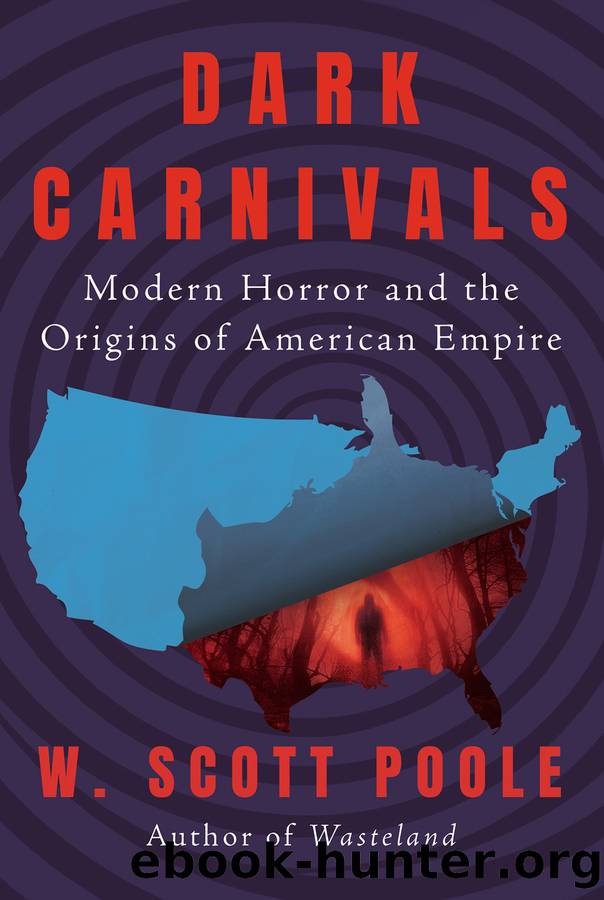Dark Carnivals by W. Scott Poole

Author:W. Scott Poole
Language: eng
Format: epub
Publisher: Catapult
Published: 2022-08-27T00:00:00+00:00
6.The Null Zone
IN THE June 1968 issue of Galaxy Science Fiction magazine, two competing ads appeared side by side. They revealed two alternative ideas about American imperial power among the most influential science fiction writers of the second half of the twentieth century.
One read, âWe the undersigned believe the United States must remain in Vietnam to fulfill its responsibilities to the people of that country.â On the facing page, readers saw a slightly longer list of names under the words âWe oppose the participation of the United States in the war in Vietnam.â The same issue included the announcement of a contest entitled âWhat would you do about the Vietnam War?â The best five answers would receive a one-hundred-dollar cash prize.
Throughout the 1960s, Galaxy was known for publishing a wide array of science fiction tales, including Ray Bradburyâs short story âThe Fireman,â which became the basis for Fahrenheit 451. In contrast to earlier science fiction magazines, editors H. L. Gold and Frederik Pohl sought to propel their work beyond its reputation as the space-adventure-for-boys genre. Galaxy hoped publishing tales with social commentary or that made use of parody and satire would help solidify SF as a serious literary phenomenon.
Kate Wilhelm and Judith Merril circulated the first call for a petition against the escalating war. Wilhelm became a multiple Nebula winner, one of the highest honors for speculative fiction, for her stories of postapocalyptic American landscapes. Merril, one of the most politically sophisticated of the somewhat directionless Futurians, joined the Trotskyite movement after realizing the brutal, and in many respects anti-socialist, direction Stalin took the Soviet Union in the thirties. By the 1960s, she actively engaged in anti-war activities while churning out a host of tales centered on nuclear nightmare scenarios.
Both women expected a near-universal condemnation of the American war in Asia from their fellow writers. Perhaps they should not have been surprised by Robert A. Heinleinâs response. Heinleinâs position regarding race, the utter supremacy of the U.S. military, and even enthusiasm for atomic weapons almost guaranteed his adamant refusal to sign.
In fact, Heinlein wrote a novel, Glory Road, in 1963 that presaged the later popularity of military techno-thrillers like those of Tom Clancy. In it, an embittered Korean War veteran goes to Vietnam to fight communists, lamenting that in Korea âwe werenât allowed to winâ and excoriating American society for its âweaknessâ in not using nuclear weapons. In an obvious allusion to his Starship Troopers fantasy of space marines waging a fascist war against monstrous bugs, Glory Road compares the ânativesâ of Vietnam with âinsects.â
Another signer of the pro-war proclamation, Joe Poyer, authored a nonfiction piece for archconservative John W. Campbellâs Analog Science Fiction and Fact suggesting that capitalism and democracy would triumph over insurgent wars of liberation in the developing world by using futuristic weaponry. In one of Poyerâs short stories, a Green Beret tricked out with war tech like some combination of the Predator and Iron Man hunts and kills his human targets mercilessly, a new incarnation of Heinleinâs Starship Troopers brutally extirpating the enemy in South Asia instead of outer space.
Download
This site does not store any files on its server. We only index and link to content provided by other sites. Please contact the content providers to delete copyright contents if any and email us, we'll remove relevant links or contents immediately.
The Kite Runner by Khaled Hosseini(5177)
Gerald's Game by Stephen King(4653)
Dialogue by Robert McKee(4400)
The Perils of Being Moderately Famous by Soha Ali Khan(4219)
The 101 Dalmatians by Dodie Smith(3509)
Story: Substance, Structure, Style and the Principles of Screenwriting by Robert McKee(3468)
The Pixar Touch by David A. Price(3437)
Confessions of a Video Vixen by Karrine Steffans(3308)
How Music Works by David Byrne(3268)
Harry Potter 4 - Harry Potter and The Goblet of Fire by J.K.Rowling(3073)
Fantastic Beasts: The Crimes of Grindelwald by J. K. Rowling(3058)
Slugfest by Reed Tucker(3002)
The Mental Game of Writing: How to Overcome Obstacles, Stay Creative and Productive, and Free Your Mind for Success by James Scott Bell(2908)
4 - Harry Potter and the Goblet of Fire by J.K. Rowling(2701)
Screenplay: The Foundations of Screenwriting by Syd Field(2640)
The Complete H. P. Lovecraft Reader by H.P. Lovecraft(2561)
Scandals of Classic Hollywood: Sex, Deviance, and Drama from the Golden Age of American Cinema by Anne Helen Petersen(2524)
Wildflower by Drew Barrymore(2487)
Robin by Dave Itzkoff(2440)
